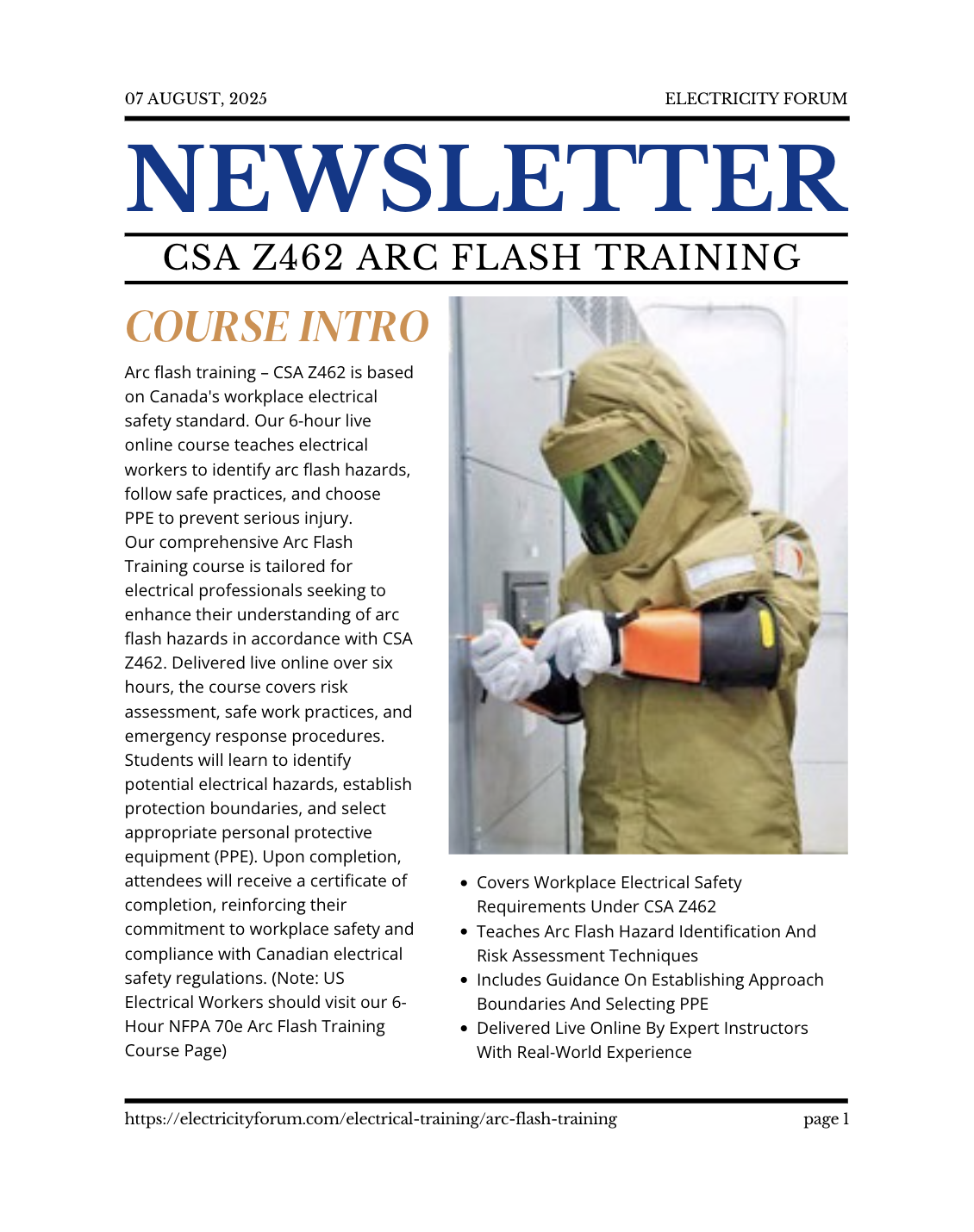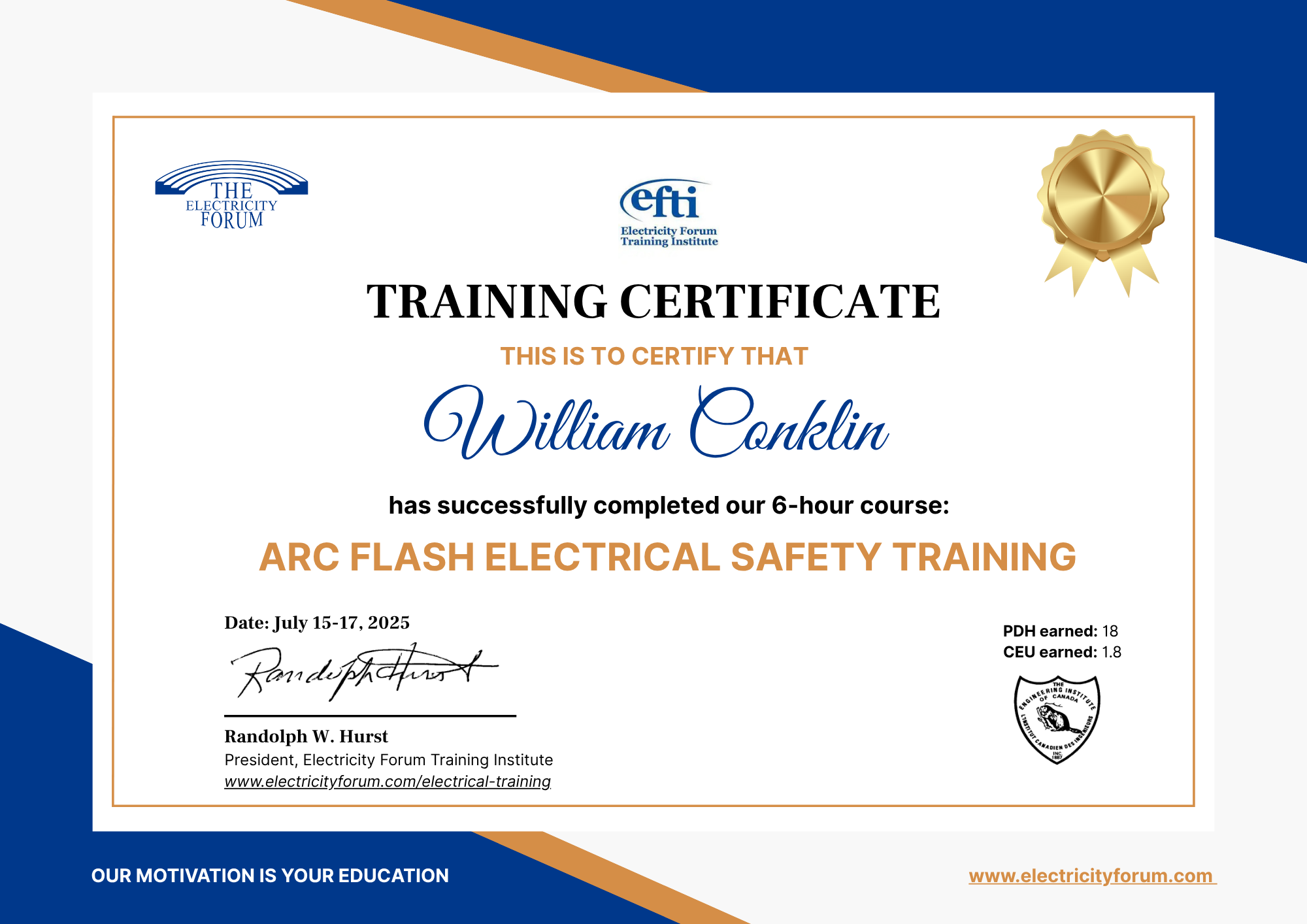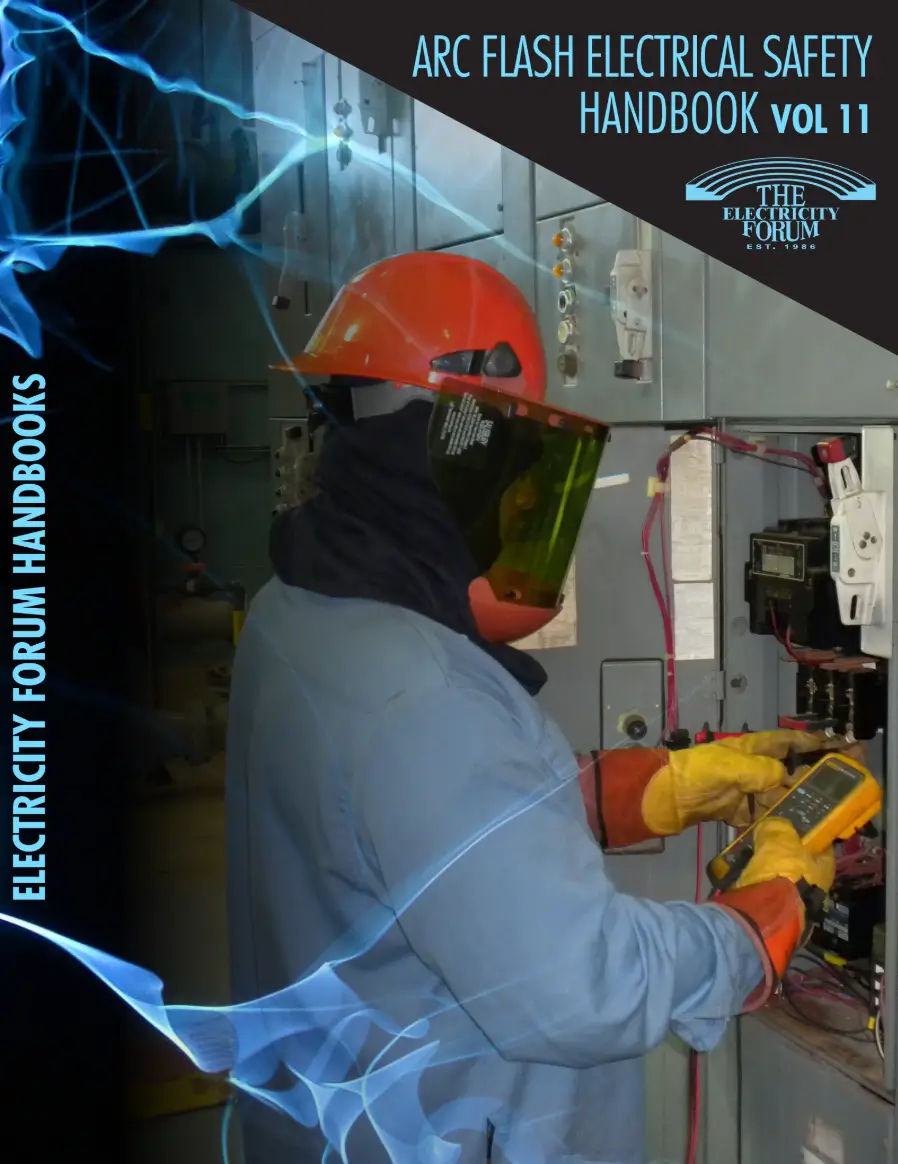Our 30-Hour Power System Fundamentals, Short Circuit Analysis & Protective Device Coordination and Arc Flash Analysis/Study course is designed for utility, industrial, commercial and institutional power system electrical engineering personnel, electrical consulting engineers, as well as electrical design engineers, who are responsible for the reliable design, engineering and operation and of industrial, commercial and insitutional electric power distribution systems. Plant, facility, and corporate electrical engineers dealing with one or more company distribution systems and consulting and utility engineers dealing with clients' systems. Consultants, architect-engineers will also find this course very beneficial.


In-person Group Training

Live Online Group Training
30 Hour Electrical Power System Training - Power System Fundamentals, Short Circuit Study & Device Coordination, Arc Flash Analysis
$1199 (with coupon: save $100)
The registration fee for this course is $1299.
Register 3 delegates at full price $1299, and get a 4th registration FREE!
Our 30-hour Electrical Power System training course is actually three separate courses: Power System Fundamentals, Short Circuit Analysis & Protective Device Coordination, and Arc Flash Analysis/Study. The three courses, taken together, are designed to help both junior and experienced electrical engineers understand electrical power systems as they apply to industrial, commercial, and institutional buildings and facilities. NOTE: The course includes a full demo of the Power System Analysis Software License.
Electrical Power System Training - Our 5-day (30 hours) live online instructor-led course is actually a series of three courses:
2. Short Circuit Analysis & Protective Device Coordination
3. Arc Flash Analysis/Study - IEEE 1584 Update
Course #1 - Power System Fundamentals - (Price: $349)
https://electricityforum.com/electrical-training/power-system-fundamentals
Our 6-hour (1-day) Power System Fundamentals course begins with sound design principles. A properly functioning electric power distribution system is vital to safety, maintenance, troubleshooting and the efficient operation of a modern industrial plant. The power distribution system comprises high-voltage utility tie circuit breakers, main transformers, medium-voltage switchgear, distribution transformers, motor control centers, electric motors, variable-speed drives, and other components. This course is designed to address all aspects of industrial power distribution systems, including system planning, equipment selection, specification and application, system grounding, protection, and conformity with electrical code requirements. Typical one-line and relay diagrams will be discussed for various applications.
Course #2 - Short Circuit Analysis & Protective Device Coordination - (Price: $599)
https://electricityforum.com/electrical-training/short-circuit-study-training
Our 12-Hour (2-Day) Short Circuit Analysis & Protective Device Coordination course provides a practical and comprehensive description of the principles and concepts of analyzing, applying, and operating protection schemes for various power system elements, including feeders, transformers, motors, buses, generators, and more. The Power Systems Coordination course extensively utilizes in-class curve drawing exercises and actual case histories to familiarize trainees with the art of power systems coordination. Selection of time/current characteristics, protection, selectivity and deriving protective device settings consistent with National Electric Code and ANSI Standard requirements are emphasized in this course. This course covers the subject of power system protection from a practical perspective, including important functional aspects such as testing and coordination of protection systems. This course is designed for individuals involved in industries and utilities that depend on proper system protection for operational efficiency and minimizing damage to equipment.
Course #3 - Arc Flash Analysis/Study - IEEE 1584 Update - (Price: $599)
https://electricityforum.com/electrical-training/arc-flash-analysis-training
Arc Flash Analysis and Study is the focus of this 12-hour (2-day) live online training course. First, you will learn to identify requirements and responsibilities from safety standards and codes (CSA Z462, NFPA 70e, IEEE 1584, NESC 410A). Next, you will examine methods for identifying and calculating arc flash hazards. Finally, we will analyze equipment selection and operational strategies to reduce risks.
These three Electrical Engineering Courses will demonstrate electrical engineering software, Simulation, and Calculations. The engineering course will provide students with an in-depth review of fault analysis problems in industrial, commercial and institutional power systems and provide the means for solving such problems, and discuss the impact of short-circuit fault currents on equipment selection.
Complete Course Details Here: (Bundle Price: $1199)
https://electricityforum.com/electrical-training/electrical-power-system-training
Live online course schedule
Sign Up For Our Electrical Training Newsletter – Stay Informed!

Who should attend
What you will get






Course #1 - Power System Fundamentals Course Outline
DAY ONE
Introduction to Industrial and Commercial Power Systems
-
Elements Of Industrial Power Systems
-
Typical Industrial Power Systems
-
Time Domain Versus Frequency Domain
-
Effects Of Frequency And Complex Impedances
-
Single-Phase Power Loads
-
Three-Phase Power Loads
-
Balanced Delta-Connected Loads And Balanced Wye-Connected Loads
-
Unbalanced Delta-Connected Loads And Unbalanced Wye-Connected Loads
Elements of Industrial Power System
- Standards And Codes
- One Line Diagram Characteristics And Purposes
- System Design Considerations:
- Safety
- Reliability
- Flexibility
- Voltage Considerations
Equipment Selection:
- Substation Transformers
- Switchgears & Circuit Breakers
- Fuses & Fuse Disconnects
- Power Distribution Centers
- Motor Control Centers
Power Substation Configuration
- Functions Of A Substation
- Simple Radial And Expanded Radial System
- Loop Systems
- Selective Systems
Voltage Considerations
- System Voltage Classes
- System Voltage Terminology
- Transformer Connections
- Effects Of Voltage Variations
- Motor Voltage Unbalance
Power factor considerations
- Power Flow Fundamentals
- Leading And Lagging Power Factors
- Typical Plant Power Factor
- Induction Motor Characteristics
- Power Factor Correction Sources
- Benefits Of PF Improvements
- Utility Power Costs
- Release Of Power System Capacity
- Voltage Improvement
- Techniques To Improve PF
- Capacitor Bank Locations
- Capacitor Bank Concerns
- Capacitors And Resonance Issues
- Capacitor Rating
- Power Factor Calculations
- Power Triangles And Calculations Procedures
Grounding
- Types Of System Grounding
- Selection Of System Grounding
- Ungrounded System
- Solidly Grounded System
- High Resistance Grounding
- Impact Of System Grounding
- Equipment Grounding
Application of Power System Analysis
- Why A Study?
- Most Common System Studies
- Load Flow Studies
- Short Circuit Study
- Coordination Study
- Arc Flash Study
- Harmonic Problems And Solutions
- Sources Of Harmonic Currents And Voltages
- Resonance Conditions
- Effects Of Harmonics
- Harmonic Analysis
Course #2 - Short Circuit Study & Protective Device Coordination
DAY ONE
- Short Circuit Theory And Analysis
- Effect Of Short Circuit, Arcing And Burning
- Fault Current Sources
- Utility System, Motor And Generators
- Fault Current Types And Characteristics
- Symmetrical Versus Asymmetrical Fault Currents
- AC And DC Decrements
- Fault Calculations, Impedance Modelling
- Balanced Faults And Unbalanced Fault
- Symmetrical Components
Balanced Fault Calculations
- Ohmic Model
- Percent Model
- Per-Unit Model
- Select And Calculate Base Values
- Data Collection And Modelling
- Data Requirements
- Utility Short Circuit Currents And X/R Ratio
- Fault Calculation Procedure
- Per-Unit Impedance Calculations
- Complex Impedance Diagrams
- Machine Reactance Modelling
- Thevenin Equivalent Networks
- Infinite Bus Calculations
- Exercise – Per Unit Modelling
- Typical Industrial Power Systems Modelling Using EasyPower Software
Electrical Equipment Ratings:
- Switchgear Rating And Selection Criteria
- Protective Device Interrupting Ratings
- Equipment Components Withstand Ratings
- Low Voltage Fuse And Circuit Breakers Rating And Selection
- Medium Voltage Power Circuit Breaker And Power Fuses Rating And Selection
- Load Interrupters
- Busway And Conductors
- Equipment Duty Calculations
- Fully Rated Systems
- Low Voltage Series Rated Equipment
- Sample Calculations
Transformer Protection
- Need For Protection
- Types Of Transformers
- Transformer Data
- Causes Of Transformer Overheating
- Transformer Primary Protective Device
- Transformer Through-Fault Capability
- Factors Affecting Transformer Protection
- Basic Transformer Protection
- NEC And CEC Requirements
- Coordination Criteria
DAY TWO
Generator Protection
- Generator Protection Introduction
- Classification Of Generator Applications
- Generator Decrement Characteristics
- Short-Circuit Performance
- Generator Protective Device
Conductor and Bus Protection:
- General Consideration
- Cable Protection
- Short-Circuit Current Protection Of Cables
- Overload Protection Of Cables
- Physical Protection Od Cables
- Code Requirements For Protection Of Cables
- Busway Protection
Motor Protection
- Factors To Consider In Protection Of Motors
- Types Of Protection
- Overcurrent Protection
- Low-Voltage Motor Protection
- Low Voltage Motor Ground-Fault Protection
- Medium-Voltage Motor Protection
- Application Of Stator Winding Temperature Protection
Overcurrent Coordination Fundamentals:
- Overcurrent Protection General Consideration
- Overcurrent Protection Guidelines
- TCC Plots
- CTIs
- Data Collection For Coordination Study
- Phase Coordination
- Ground-Fault Coordination
- Ground-Fault Protective Schemes
Fuse Characteristics:
- Low Voltage Fuses
- Power Fuses
- TCC Curves
- Fuse Coordination Criteria
- Current-Limiting Characteristics
- Application Of Low-Voltage Fuses
LV Circuit Breaker Characteristics:
- Molded Case Circuit Breakers (MCCBs)
- Low Voltage Power Circuit Breakers
- Time Current Curves (TCC)
- Coordination Criteria
Time overcurrent relays
- Introduction
- Electromechanical Relays
- Relay Characteristics
- Solid State Relays
- CTIs
Exercise:
EasyPower System Modelling Exercise
Course #3 - Arc Flash Analysis/Study - IEEE 1584 Update
DAY ONE
1. An Overview of Fault Current Analysis
- Fault Current Sources
- Short Circuit Current Parameters
- Actual Fault Types
- Balanced Fault Analysis
- Impedance Diagrams
- Fault Current Calculations
2. Overcurrent Coordination Fundamentals:
- Overcurrent Protection General Considerations
- Protection Guidelines
- TCC Plots
- CTIs
3. Fuse Characteristics:
- Low Voltage Fuses
- Power Fuses
- TCC Curves
- Fuse Coordination Criteria
4. LV Circuit Breaker Characteristics:
- Molded Case Circuit Breakers (MCCBs)
- Low Voltage Power Circuit Breakers
- TCC Curves
- Coordination Criteria
5. An Introduction to Arc Flash Calculations
- Arc Flash Analysis
- Causes Of Electrical Flash Events
- Why Perform Arc Flash Studies? Who Should Perform Them?
- CSA Z462/NFPA 70ENF
- IEEE Standard 1584
- Fault Magnitudes
- Overcurrent Device Responses
6. Major Changes in IEEE 1584-2018
- Electrode Configurations
- Typical Working Distance
- Classes Of Equipment And Typical Gap
- Transformer Exception At 240V
DAY TWO
7. Calculation Methodology
- Overview Of Protective Device Coordination
- Understanding Time-Current Curves
- Fault Current Vs. Energy Released
- Calculating With Uncertainty
- Protective Device Trip Time
8. Data Collection Process
- How To Improve Outcomes
- Data Collection Activities & Skill Sets
- Obstacles In Data Collection
- Required Equipment/Device Information
- Understanding Short-Circuit Ratings
9. Arc Flash Calculations Continued
- Accumulated Energy
- Minimum And Maximum Faults
- Use Of Tolerances
- Current-Limited Devices
- System Modes Of Operation
- Calculating Arcing Current
- Determine Of Arc Duration
- Calculate The Incident Energy
- Arc-Flash Boundary Calculations
10. Mitigating Risk of Arc Flash Hazards
- Clearly Understanding Risk Vs Hazard
- Overview Of Electrical Equipment
- How To Reduce Arc Flash Levels
- Fuse-Protected Vs. Non-Fuse-Protected Circuit Breakers
- Arc-Resistant Switchgear
- Arc Flash Label Issues
- Safety: The Overriding Concern
Exercise: Arc Flash Analysis using EasyPower Software
COURSE SCHEDULE:
All days:
Start: 10 a.m. Eastern Time
Finish: 4:30 p.m. Eastern Time

Live online course registration fees & CEU credits
The registration fee for this course is $1299.
What you will get






Download free discount coupon
Enter Your Information
Fill out the form below with your name and email address.
Receive Your Coupon
Check your email for a message with a link to your $50 discount coupon.
Register for the Course
Use the coupon code when you sign up for the Advanced Electrical Safety Training course to save $50 off the regular price.

Group Offer
Register 3, Get 1 Free
Register 3 delegates at the full price of $249 each and get the 4th registration free! Perfect for companies, safety departments, and teams looking to train multiple employees at once.
Earn Continuing Education Unit (CEU) Credits
- Successful completion of this course qualifies delegates to receive a certificate of course completion with indicated CEUs.
- CEUs are granted by the Engineering Institute of Canada.
- One CEU is equivalent to 10 professional development hours of instruction.
- This course earns 0.6 CEUs.

Request a free training quote – Live Online & In-Person Group Training
Whether you choose live online or in-person instruction, our electrical training can be customized to your needs and delivered to your team at one or multiple locations.
Our instructors will work with you to assess your team's skills and tailor the training to match your requirements.
Complete this handy form and I will send you a FREE written Quotation on any electrical training you need! Or send me an email and I will contact you to discuss your electrical training requirements Today!
Get the 2026 Live Online Training Catalog
Explore 50+ live, expert-led electrical training courses – interactive, flexible, CEU-certified.
Download Catalog
Download Course Brochure
Get detailed information about this course in our comprehensive brochure.
Download Brochure (PDF)Download free discount coupon
Enter Your Information
Fill out the form below with your name and email address.
Receive Your Coupon
Check your email for a message with a link to your $50 discount coupon.
Register for the Course
Use the coupon code when you sign up for the Advanced Electrical Safety Training course to save $50 off the regular price.

Group Offer
Register 3, Get 1 Free
Register 3 delegates at the full price of $249 each and get the 4th registration free! Perfect for companies, safety departments, and teams looking to train multiple employees at once.



